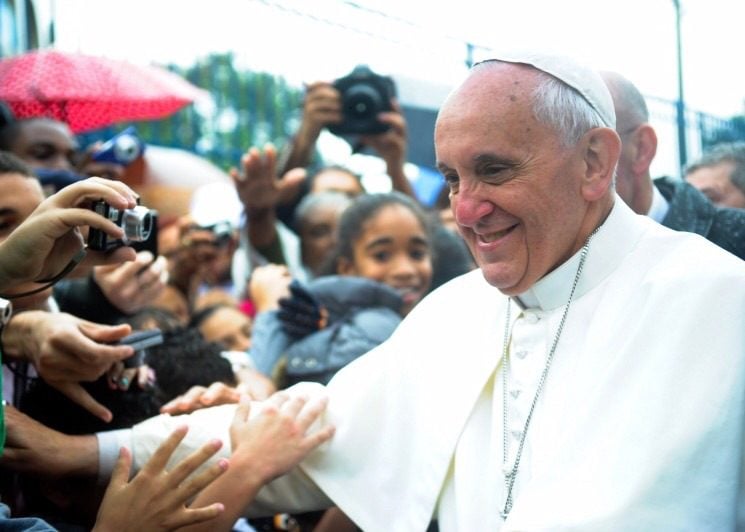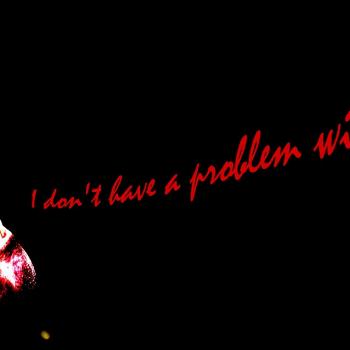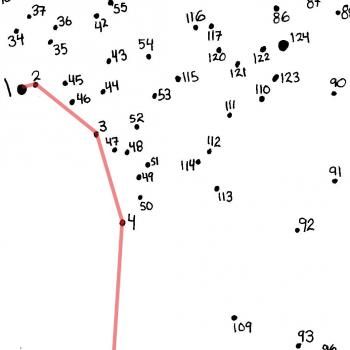
On October 13, Protestant bishop Bernard Folly Fellay, of the Society of St. Pius X (SSPX), gave a homily, of sorts, in which he insisted that he’s Catholic. (I think that nominalism is a modernist error.) The occasion was the Pontifical Mass for the Angelus Press Conference, at St. Vincent de Paul, in Kansas City. The whole thing was meandering and schizophrenic, and I have not yet decided what was worst about it. It may have been the many occasions Good Bp. Folly Fellay (GBF) took to display his own brand of Pope Francis Derangement Syndrome (and Vatican II Derangement Syndrome). Or it may have been a more general evil; namely, that his sect appropriates the name of Pius X in its schism from the Church. Martin Luther kept insisting he was Catholic too; he had Leo X Derangement Syndrome—those who came after, Trent Derangement Syndrome; but at least he did not call his sect the Society of St. Gregory the Great. (John Calvin said that Gregory was the last good pope.)
IN THE INSTANT THAT I PREACH
GBF began well enough, as he often does in this sort of colloquy. He said, rightly, that God is infallible (~4:15). He asked, Who are we to dispute God’s divine providence? (~6:50). He said that we must hate what is opposed to God. (~9:35). Then he went on, blind to irony, to do the very thing he just said we must not do, and to defend the very thing he said we must hate.
For no sooner had he finished this twelve-minute exordium, than he asked—and with a great deal of pathos, too—“What’s going on?” (~12:35). He insisted that there is a “crisis in the church” (~12:47) and that the SSPX has reached a “zero level with Rome” (~20:27). He told his schismatic flock of Protestant sheep that “We have to say no to the authorities” (~13:00).
Here he stands; he can do no other.
But one must ask—since the question appears not to have occurred to GBF—whence the authorities derive their authority. If he would have but considered this question, and from the Catholic point of view (for he is Catholic, as he tells us with flash of rhetorical thunder), then he would know the answer. Their authority comes from God—the very same God GBF just told us is infallible and whose divine providence is not to be questioned. Hear what Christ tells the apostles.
Whoever listens to you listens to me, and whoever rejects you rejects me, and whoever rejects me rejects the one who sent me. (Luke 10:16)
If GBF wants the SSPX to “say no to the authorities,” then he is telling them to say no to Christ and no to God.
But that is not the end of Christ’s words, for Christ promises the apostles they will have the assistance of the Holy Spirit.
When the spirit of truth comes, he will guide you into all the truth. (John 16:13)
He will guide the Church into all the truth. Not some of the truth. Not a portion of the truth mixed with error. But what GBF does, in his vagabond discursion into heresy, is to set meaningless limits on the charism of Infallibility.
The assistance of the Holy Ghost has been promised to the Holy Father, to the successor of St. Peter … only to keep safely and transmit faithfully the deposit that is what the Church has received from God. (~15:35-15:55)
The reason the distinction is meaningless is because it relies on a false supposal that the successor of St. Peter might fail to “keep safely and transmit faithfully” the deposit of faith. But the whole point of the doctrine of Infallibility is that the assistance of the Holy Spirit prevents any such thing in the first place. Individual Catholics do not sit in judgment on the pope and say, This is faithful to the deposit of Faith, so I accept it; but that over there is not faithful, and so I reject it. Once we start doing that, we are no longer Catholic; we are Protestant. Our name is not Pius X but Luther, Calvin, Zwingli, Knox. We have allowed private judgment to influence which Church teachings we will accept, which we will not.
Pastor Aeternus, the Vatican I document that defined the dogma, allows no such distinction and no such leeway.
We teach and define that it is a dogma Divinely revealed that the Roman pontiff when he speaks ex cathedra, that is when in discharge of the office of pastor and doctor of all Christians, by virtue of his supreme Apostolic authority, he defines a doctrine regarding faith or morals to be held by the universal Church, by the Divine assistance promised to him in Blessed Peter, is possessed of that infallibility with which the Divine Redeemeer held that his Church should be endowed in defining doctrine regarding faith or morals, and that therefore such definitions of the Roman pontiff are of themselves and not from the consent of the Church irreformable.
PA says nothing about “infallibility if.” Vatican II, in Lumen Gentium, comments.
Bishops, teaching in communion with the Roman Pontiff [That is an important qualification.] are to be respected by all as witnesses to divine and Catholic truth. In matters of faith and morals, the bishops speak in the name of Christ and are faithful to accept their teaching and adhere to it with religious assent. This religious submission of mind and will must be shown in a special way to the authentic magisterium of [Whom?] the Roman Pontiff, even when he is not speaking ex cathedra; that is, it must be shown in such a way that his supreme magisterium is acknowledged with reverence, the judgments made by him are sincerely adhered to, according to his manifest mind and will. His mind and will in the matter may be known either from the character of the documents, from his frequent repetition of the same doctrine, or from his manner of speaking.
Yes. And this would include conciliar documents solemnly promulgated by the Holy Father, as all the documents of Vatican II were by Pope Paul VI.
Although the individual bishops do not enjoy the prerogative of infallibility, they nevertheless proclaim Christ’s doctrine infallibly whenever, even though dispersed throughout the world, but still maintaining the bond of communion among themselves and with the successor of Peter, and authentically teaching matters of faith and morals, they are in agreement on one position which is definitively to be held. [Now take note here, GBF.] This is even more clearly verified when, gathered together in an ecumenical council, they are teachers and judges of faith and morals for the universal Church, whose definitions must be adhered to with the submission of faith.
Now here’s the key sentence where GBF stumbles in his interpretation.
And this infallibility which the Divine Redeemer willed His Church to be endowed in defining faith and morals, extends as far as the deposit of Revelation extends, which must be religiously guarded and faithfully expounded. (LG 25)
What that last paragraph means is not that the pope is infallible only when he is consistent with the deposit of Revelation; as though it were possible for him, when defining doctrine or teaching morals, to be inconsistent. What it does mean, rather, is that the official teaching of the pope is equal in authority to “the deposit of Revelation.” For it is through the pope’s teaching that the deposit of Revelation is “faithfully expounded.”
But what GBF has done here is to set up a false dichotomy, whereby he may justify his own private judgment. Like any Protestant, he picks and chooses and says: These parts of Vatican II are true and faithful; these other parts of Vatican II are ambiguous and might be interpreted as either Catholic or modernist; but this third portion of Vatican II is clearly erroneous and the SSPX can under no circumstances accept it. That is no different from what Martin Luther did.
ABSTRACT THREATS
And from that starting point, GBF turns his rhetorical fire on Pope Francis and declares: “We are about to see something very, very serious. The way he believes, what he says, is going to divide the Church!” (~22:23-22:27). Imagine the spectacle of a sect breaking away from the Church, refusing opportunities for reunion, obstinately casting aspersions on both the Magisterium and an entire council, and then accusing the pope of causing division! Dr. Freud would like to have some words with you now.
GBF even goes so far as to speculate that “maybe” Francis is not the true pope (~23:45). “From the very start,” he says, “we’ve had the impression that there is something wrong with this pope” (~24:15). “What’s his problem with the red shoes?” he wonders (~24:52). Appealing to an unanchored sense of certain doom, GBF asks, “What is his vision, his plan? What [does he] want to do?” (~25:20). GBF is “scared to death” of Francis because he says both Catholic and modernist things (~26:02). The pope speaks “rubbish” (~30:00) and wants to “reread the Council in the light of modern culture” (~32:31). The SSPX is “in front of a major fight” (~33:52). In Francis it is confronted with “a genuine modernist,” who might conceivably be capable of living the Faith, but “is [also] capable of [teaching] the contrary” (~41:00-41:27). Having opened the vent to all that wind, GBF very sensibly concludes by admonishing his flock to “be prudent when you talk about the pope” (~30:54). (His own words, over the previous seven minutes, having been a model of prudence.)
Here are the two specific errors of which GBF accuses Pope Francis: that he is a relativist, and that he “doesn’t care” about Mary and thinks of her as “an obstacle to ecumenism” (~50:50). If you are stumped by the last one, you will be even more stumped when I get to that point and reveal the basis for GBF having made such a bizarre statement.
GOOD AND BAD: I DEFINE THESE TERMS
But first, let’s take up the charge that Francis is a relativist. In saying this, GBF is thinking of a statement that Francis made—where else?—in an interview, this one in September with atheist and journalist Eugenio Scalfari. The interview generated the following alarmist, dishonest, and outrageously vernacular headline: “OH SNAP! Pope says NO Moral Absolutes!” If you are scratching your head as I am, let us go to the pope’s words and see where this odd headline comes from.
Francis: The world is criscrossed by roads that come closer together and move apart, but the important thing is that they lead toward the Good.
Scalfari: Your holiness, is there a single vision of the Good? And who decides what it is?
Francis: Each of us has a vision of good and evil. We have to encourage people to move towards what they think is good.
Scalfari: Your Holiness, you wrote that in your letter to me. The conscience is autonomous, you said, and everyone must obey his conscience. I think that’s one of the most courageous steps taken by a pope.
Francis: And I repeat it here. Everyone has his own idea of good and evil and must choose to follow the good and fight the evil as he conceives them. That would be enough to make the world a better place.
These words caused even the normally sensible Katrina Fernandez—the “mackerel-snapping papist” at The Crescat—to declaim thus: “Dear God, what is it now?” and “[I am going to] drink this papacy away.” Ms. Fernandez even gave her approval to a comment in which the author (“Quittin’ Time at Tara”) called the pope “a crazy uncle chained to [our] legs,” an “insult” to Catholics, and a “progressive goofball” who must be “[withstood] … to the face.” ♪Proud ’neath heated brow … ♫
But look a bit more carefully at what the pope said. We must keep two things in mind here. The first is that he is not speaking ex cathedra about faith and morals; he is not defining any dogma that Catholics must believe. He is speaking—and this is the second thing—to an atheist journalist who writes for an Italian socialist newspaper, la Repubblica. The interview is a follow-up to an earlier letter Francis had written to Mr. Scalfari, in response to the journalist’s request for a discussion about faith and unbelief. The pope’s primary audience, in other words, is not Catholics but atheists and socialists. Some of them, among the newspaper’s readers, might be open to the pope’s views. Some of them might be open to the possibility of faith.
This section of the interview begins with Francis speaking about “the Good,” in the singular—with a capital G. He doesn’t speak of “goods,” in the plural. He speaks as though “the Good” is an actual category. That prompts Mr. Scalfari to ask, “Is there a single vision of the Good?”
Pope Francis responds, “Each of us has a vision of good and evil.” But note very carefully what he does not say; he does not say that good and evil are false categories. In fact, the pope denies that anyone believes that there is no good and no evil; he denies that anyone can be a relativist in the first place. If there is only “my good” and “your good,” then by definition there is no good. If there is “my evil” and “your evil,” then by definition there is no evil. There is only preference. But that is not what the pope said. What he said was, “Each of us has a vision of good and evil.” In other words, each of us believes in absolutes. Far from embracing relativism, Francis denies even the possibility of relativism.
The pope—and this is very, very important to understand, dear reader, and I want you to underscore it thrice in red ink—begins his discussion the exact same way C.S. Lewis begins Mere Christianity: with the observation that everyone believes that good and evil are real things.
Francis goes on to say, “Everyone has his own idea of good and evil and must choose to follow the good and fight the evil as he conceives them.” Now, that might appear to be relativist, particularly in the “as he conceives them” part. But the pope has only reinforced what he has already said. If everyone has his own idea of good and evil, then everyone is a moral absolutist. And if everyone follows his idea of good and fights his idea of evil, he is fighting for moral absolutes. What Francis is saying is that everyone has a conscience, and that everyone must follow his conscience.
God, after all, has written the law on our hearts (Rom. 2:15); and that is why—again, as C.S. Lewis understood—there are no significant moral differences between peoples and cultures. Any points of difference, Lewis says in Mere Christianity (Harper Collins paperback of 2001),
have never amounted to anything like a total difference. If anyone will take the trouble to compare the moral teaching of, say, the ancient Egyptians, Babylonians, Hindus, Chinese, Greeks, and Romans, what will really strike him will be how very like they are to each other and to our own.
Did the Nazis really not know, Lewis asks, that what they did was evil? Likewise, did the 9/11 terrorists really not know that flying a plane into a building was objectively wrong? If the Nazis did not know that murdering six million Jews was evil, Lewis asks, then how could we have blamed them for that? (5-6).
In a clever act of theological jujitsu, Francis has recalled Mr. Scalfari to moral basics. A true relativist would deny that good and evil exist. But Francis does not say that. There might be points of difference, or points of weakness, in the moral understanding of an atheist when compared to the moral understanding of a Catholic; the moral conscience does need to be formed. But when talking to an atheist, one has to start somewhere; and Francis starts with a most basic truth: that good and evil are real.
It is a wicked myth that human beings walk about the world with different notions of fundamental good and evil. How could God blame us if we didn’t think that murder was wrong? But no one who commits murder—no one, unless he is clinically insane—thinks that murder is okay. No one believes that, by killing someone, he is pursuing The Good. People who murder others do so because they are defying what they know to be right. If adulterers thought that adultery was “the good,” why do they sneak around guiltily when they’re having an affair? If shoplifters thought that theft was okay, why do they skulk around stores and keep a sharp eye out?
Pope Francis is right: The world would be a better place if people would pursue even “their own idea” of good and fought even “their own idea” of evil. Everyone has a conscience; who would deny the world would be better if people would just follow it? Francis did not say a perfect place. But our basic sense of right and wrong do come from God, even when we deny Him. To be sure, many consciences are malformed. To be sure, there is a lot of cultural detritis to be cleared away. But the moral sense is there, and all Pope Francis is doing is reminding us of that. To be reminded is the first step.
Now, perhaps Francis’s words were poorly chosen and lacked nuance. But this was an oral interview, and Francis spoke off the cuff. If I recall correctly, Benedict XVI raised eyebrows with some remarks about condoms, in this interview. How soon we forget. If you are looking for unambiguous words and nuanced precision in an interview, that’s nonsense. If you are worried that the media will misinterpret Francis, get over that.
It is unremarkable to me that Francis said that everyone has “his own idea” of good and evil. What is remarkable, by contrast, is that, in talking to an atheist, Francis said that good and evil are real, and no one denied it. No one came out and said, “Oh, no, the pope’s wrong, good and evil don’t really exist, you know.” What they did do was to take the statement that everyone believes in good and evil and treat it as though it were a denial of good and evil. And GBF fell for that one. (So did otherwise good and sensible souls, like Ms. Fernandez.)
We must think about this question logically. (Get those red markers out.) Is it logical to believe that the same pope who said that Jesus can not be found outside the Church would be a relativist? Is it logical to believe that the same pope who said that you cannot pick and choose what you believe as a Catholic would be a relativist? To believe that, I would have to believe that Francis is inconsistent or confused in his beliefs, and that he says whatever comes into his mind at the moment.
That is a huge assumption to make. Occam’s razor will be of help here. Occam’s razor is the principle, in philosophy, that says that the truth, between competing hypotheses, is usually whatever requires the fewest, or least complex, assumptions. (That is why conspiracy theories are almost always false. The Da Vinci Code receives a negative score on the Occam’s razor test.)
In this case, Occam’s razor tells me that Pope Francis’s remarks to Scalfari have been misunderstood. Far more assumptions, and a lot of unanchored fear, must be accepted in order to reach the conclusion that Pope Francis is wildly inconsistent, and does not know what he believes, and might be a dangerous modernist who’s out to destroy the Church, and may not even be the real pope because someone in the College of Cardinals MURDERED! Cardinal Burke (who was really elected and took the name Pius XIII) and sent a double out to pose as Cardinal Burke so no one would be the wiser.
But it is worth pointing out (underscore this thrice in red too, dear reader) that Pope Francis has said nothing that the Church has not already told us. Here are the words of the Second Vatican Council, in Lumen Gentium 16.
Those also can attain to salvation who through no fault of their own do not know the Gospel or Christ or His Church, yet sincerely seek God and moved by grace strive by their deeds to do His will as it is known to them through the dictates of conscience. … Whatever good or Truth is found by them is looked upon by the Church as a preparation for the Gospel.
And here is John Paul II, in his General Audience on September 9, 1998.
It must first be kept in mind that every quest of the human spirit for truth and goodness, and in the last analysis for God, is inspired by the Holy Spirit. The various religions arose precisely from this primordial openness to God. … [E]very authentic prayer is is called forth by the Holy Spirit, who is mysteriously present in the heart of every person.
And here is Benedict XVI (another “progressive goofball” and “crazy uncle,” I guess), in his General Audience of November 30, 2005, citing no less an authority than St. Augustine of Hippo for this same sentiment.
Let us entrust ourselves to St. Augustine for a further meditation on [Psalm 137]. The great Father of the Church introduces a surprising and very timely note: he knows that there are also people among the inhabitants of Babylon who are committed to peace and to the good of the community, although they do not share the biblical faith; the hope of the Eternal City to which we aspire is unknown to them. Within them they have a spark of desire for the unknown, for the greater, for the transcendent: for true redemption.
And Augustine says that even among the persecutors, among non-believers, there are people who possess this spark, with a sort of faith or hope, as far as is possible for them in the circumstances in which they live. With this faith, even in an unknown reality, they are truly on their way towards the true Jerusalem, towards Christ.
In fact, it is anti-Catholics (like this one) who ’plain that such statements amount to “inclusivism.” By “inclusivism,” what the anti-Catholic means is the belief that everyone will end up in Heaven. But that is not how Catholics should understand the words of Vatican II and the last three popes. They should understand them as no more than an exegesis of 1 Timothy 2:4, which tells us that God “desires everyone to be saved and to come to the knowledge of the truth.” Thus God can inspire a longing for the Good even in those who understand it poorly. Those who reject such longings, written in all hearts, and commit what they know to be evil, are in danger of Hell, and they do exist. But they are not confused about the Good; rather, they reject it and suppress any desire for it.
Catholicism is “inclusivist,” in Dr.* White’s view, because it has a “defective view of the atonement.” In other words, Catholics do not believe, as Calvinists do, in a limited atonement. “There seems little chance the trend in Rome will ever turn back to its former beliefs,” Dr.* White ’plains—as though St. Augustine is not to be included among our “former beliefs”; as though Catholicism once did teach limited atonement; as though we are to believe that, if only Rome would embrace its “former beliefs,” Dr.* White would sign up for the nearest RCIA program before the Phoenix sun rose anew. But no.
IN A SOLDIER’S STANCE I AIMED MY HAND AT THE MONGREL DOGS WHO TEACH
Much harder to believe is GBF’s wild accusation that Pope Francis “doesn’t respect” Our Lady and views her as an “obstacle” to ecumenism. The basis for this bit of rhetorical bravado is the fact that Pope Francis did not consecrate Russia to Mary, as Mary requested at Fatima. Instead, Francis entrusted “the world” to Mary. (As though Russia did not belong to the world.) This is an old plaint of traditionalists, and I often find it on sites that are otherwise sound.
But the fact is, Pope Francis followed the exact same form of consecration used by every one of his predecessors, beginning with Pius XII. (Did you hear that, GBF?)
Now, am I to believe that Pius XII was a dangerous modernist? Did Pius XII, who defined the dogma of the Assumption, hate Our Lady? Did John Paul II think that Mary was an “obstacle”? Did he go to bed at night, saying, “Hail Mary, full of grace, would you please get out of my way”?
Occam’s Razor might be of help again.
GBF is in a muddle of his own making. If he is right that Vatican II contains errors, and if he is right that all popes since John XXIII have taught error, then he concedes the possibility that the Church can teach error—even the certainty that it has. That is not the Catholic point of view. The Catholic point of view was taught at Vatican I. But suppose that Pope Francis were to wake up tomorrow and issue the following statement:
By the authority of our Lord Jesus Christ, of the Blessed Apostles Peter and Paul, and by my own authority, I pronounce, declare, and define it to be a divinely revealed dogma that the Second Vatican Council, and all popes from John XXIII to Benedict XVI, taught the heretical modernist errors I have laid out in the present apostolic Constitution.
That would also be a concession that the Church can, and indeed has, taught error; and that the Church can reverse or change its teachings. That is not the Catholic position either.
The only consistent Catholic position is this: If I believe that Vatican II taught error, or that all popes beginning with John XXIII taught error, then the error is not with the Church but with myself. My duty is to solve my own error, not to form my own sect.
Pope Francis Derangement Syndrome is the anti-Catholic Protestant’s best friend.
UPDATES
1. Fr. Dwight Longenecker has an interesting article here comparing Bishop Fellay’s homily to the end-times preaching of Protestant fundamentalism.
2. Catholic in Brooklyn has posted this very well-done article on why Vatican II is “a message for our time.”
3. Here is the weirdest example yet of why Occam needed a razor and why “mesmerized sleepy Catholics” such as myself need the term Pope Francis Derangement Syndrome. This site is beyond reason mad. I would need to invent a whole new language to describe derangement this far gone. Suffice it to say my point was not—as the blog author says—to redefine relativism as “whatever a person believes is a moral absolute is a moral absolute.” I defy anyone to point out where I said any such thing in this article. Of course moral absolutes exist independently of what people think. I have no dispute with that. What I did say was that, whatever a person might say to the contrary, everyone believes that moral absolutes exist, and therefore no one is a relativist. Whether their own beliefs line up with those moral absolutes is a different question; to attack this article, “Remnant Clergy” falsely conflates the two.
***
If you like the content on this blog, your generous gift to the author helps to keep it active. I remember all my supporters in my Mass intentions each week.












